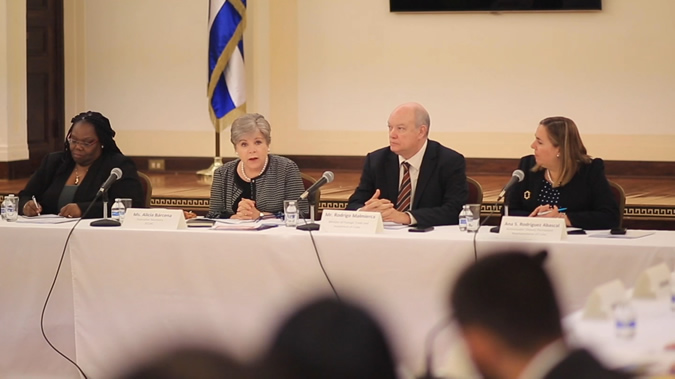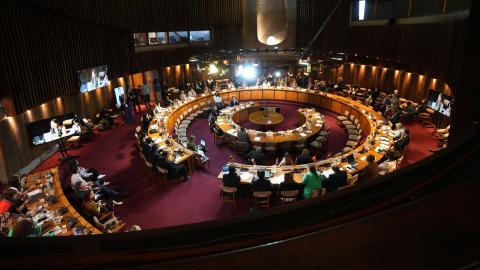Press Release
“The Forum of the Countries of Latin America and the Caribbean on Sustainable Development has become a space of political consensus and peer learning among Member States. It is also an example of regional coordination among multiple stakeholders: governments, the UN system, the private sector, the academic sector and civil society,” said Alicia Bárcena, ECLAC’s Executive Secretary, at a meeting today in New York with representatives of the countries of the region in the context of the High-Level Political Forum being held at United Nations Headquarters.
The purpose of the meeting was to announce the main results of the third meeting of the regional Forum held in Santiago, Chile in April 2019, and inform on preparations for the fourth, scheduled to take place in Havana, Cuba in April of next year.
The meeting took place at the headquarters of the Cuban Mission to the United Nations, and was led by Alicia Bárcena and Rodrigo Malmierca, Cuba’s Minister of Foreign Trade and Foreign Investment, with attendance by representatives from 23 countries of the region: Argentina, Bahamas, Belize, Bolivia, Brazil, Chile, Colombia, Costa Rica, Ecuador, El Salvador, Grenada, Guatemala, Honduras, Jamaica, Mexico, Nicaragua, Panama, Paraguay, Saint Kitts and Nevis, Saint Vincent and the Grenadines, Trinidad and Tobago, Uruguay and Venezuela.
After giving a recount of the third meeting of the Forum, the ECLAC Executive Secretary underscored the presentation of the Quadrennial report on regional progress and challenges in relation to the 2030 Agenda for Sustainable Development in Latin America and the Caribbean, prepared jointly for the first time by ECLAC and the regional offices of UN agencies, funds and programs.
Alicia Bárcena also highlighted that during the Forum’s conclusions and recommendations, the countries had applauded the Caribbean First initiative. “We are all committed to the Caribbean and will continue working in this sense. I appreciate the broad participation of the countries in the Forum; we had over 1000 attendees at this year’s meeting, 25 Forum member countries (33 countries in total), the United Nations system, 15 resident coordinators, and more than 300 members of civil society. There were also 50 side events,” she said.
Bárcena went on to announce that the fourth meeting of the Forum will take place in Havana in April 2020, with Cuba as President pro tempore. She explained that on that occasion, instead of producing the respective report, countries will be offered a new tool for tracking and monitoring the 2030 Agenda, known as the SDG Gateway Platform, which ECLAC is preparing through its Statistics Division. “The idea is to have a regional digital platform with useful information on progress toward the Sustainable Development Goals (SDGs). This will include initiatives, projects and analysis of topics relevant to the integrated tracking of the 2030 Agenda from all fields of knowledge and diverse sources, both national as well as the United Nations system as a whole at the regional level, that is useful for countries” she explained.
She also announced that the ECLAC’s 38th session – the organization’s main biennial meeting – will be held in May 2020 in Costa Rica. “I would like to highlight that, in line with Costa Rica’s national policy of decarbonization, the session will be a paperless one, where we will also want to measure our carbon footprint, as requested by the Costa Rican government. We believe this is a great sign,” she said.
Bárcena went on to announce the calendar of conferences for ECLAC’s subsidiary bodies for the second half of 2019, including: the 17th meeting of the Regional Council for Planning of the Latin American Institute of Economic and Social Planning (ILPES), in Montevideo (August 28-30); the third meeting of the Regional Conference on Social Development of Latin America and the Caribbean, in Mexico City (October 1-3); the 14th meeting of the Regional Conference on Women of Latin America and the Caribbean, in Santiago, Chile (November 4-8); and the tenth meeting of the Statistics Conference of the Americas, in Santiago, Chile (November 19-21).
She also extended an invitation to participate actively in COP 25, under the presidency of the Government of Chile, in Santiago (December 2-13). Over that week, ECLAC will organize an array of side events for the governments of the region.



